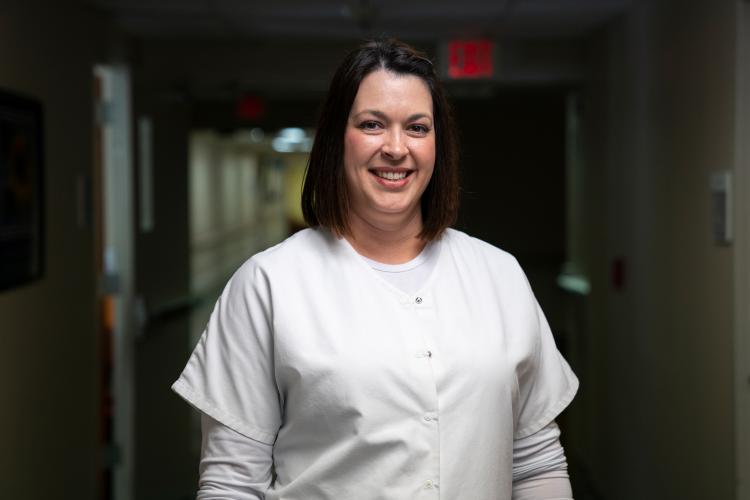
Every year, a few of the 2,500 or so nurses who work at JPS Health Network decide they’re ready for a different challenge and opt to move on to a different place to work.
It’s not surprising to their colleagues that many of the nurses who leave come back, according to Elisabeth Rodgers, Director of Clinical Services. She said JPS can be a more demanding place to work than others. But that’s part of what makes it a great place for a career.
“It takes a special kind of nurse to work at JPS,” Rodgers said. “People, in life, usually figure out where they need to be. I think passionate and dedicated nurses love to work here because of their relationship with our patients and because of the culture. There is a sense of fulfillment working with the vulnerable population we serve that isn’t the same anywhere else.”
As the public hospital, JPS often receives patients who neglected to get treatment as long as possible because they don’t have insurance. As Tarrant County’s only Level I Trauma Center, JPS often receives severely injured patients who require a high level of care for an extended period of time. Making a difference to people who need help the most is what JPS nurses are all about.
Angelique Miller, an LVN at the Viola Pitts Clinic, said she had worked her whole career at JPS and thought she owed it to herself to find out what working someplace else is like.
“I had been working for JPS for eight years,” Miller said. “I loved it here and I was happy. But I just felt like I needed to see what else was out there. I applied at another hospital and I got the job but, when it was time to go, I found it harder than I thought it would be to leave.
Miller’s misgivings didn’t go away over time. She couldn’t shake the idea that leaving her team was a mistake.
“It was a whole different world for me at my new job.” Miller said. “The teams weren’t the same with how they were run and it didn’t feel like a family working there like it does at JPS. It felt like everyone was just there to collect a paycheck. I promised myself that I would give it at least six months to make sure I wasn’t just homesick, but the way I felt never changed. When the six months were up, I left.”
Miller applied to come back to JPS and was hired to fill her current role at Viola Pitts.
“I’ve loved being back ever since,” Miller said. “I have no question that I am where I belong. There’s nothing out there that’s better. This is a very family-oriented place to work. They treat you with respect like we’re all on the same level. As long as I have worked here, I am still amazed every time I see Mr. (Robert) Earley walking around, talking with patients. You’re not going to see the CEO of the hospital doing that anywhere else.”
RN Lesli Archibald, of 2 South Women’s had a similar experience. She decided to try something different to see what it was like elsewhere. She talked about how she missed JPS so much that, when she decided to come back, another nurse she’d befriended asked if she could come, too. RN Thao Nguyen said working at JPS is just as rewarding as Archibald made it out to be and she wouldn’t dream of working someplace else.
“I really missed the relationship we have with the patients here,” Archibald said. “As cheesy as it sounds, it’s really all about the patients. JPS is just a different place. It’s a very caring environment. The leadership looks out for nurses and helps us to make ourselves better every day.”
Nguyen said she didn’t realize there would be so much difference between one hospital and another.
“When Leslie told me she didn’t like her new job I was totally shocked,” Nguyen said. “So, we had multiple conversations about it and I became very interested in JPS. Coming here was the best decision of my career. I never looked back.”
RN Julie Rogers, Clinical Coordinator of the Sepsis Program said it wasn’t her choice to leave after practically growing up at JPS.
“I actually started here as a junior volunteer when I was in high school,” Rogers said. “I was hired as a tech in 1997 and worked here until 2007. I got married and my husband was in the military, so we went off to play Army for eight years. It was bittersweet to have to leave.”
Rogers graduated from being a tech to an LVN. Then she became an RN and now she is a nurse practitioner.
“I came back in February of 2015 and was glad to find so many people that I worked with before were still here,” Rogers said. “It was great to be a part of such a great team again.”
Jeri Ames, RN Clinical Manager on the 2 South Women’s Health Unit said leaders understand why nurses sometimes feel they want to try something else for a while. But they get a sense of who is likely to come back – and those are the type of nurses JPS welcomes with open arms.
“In my career I have found that when you look at things from the outside, sometimes the grass looks greener,” Ames said. “When you get there, what you may find is that all the green grass is really just weeds.”
